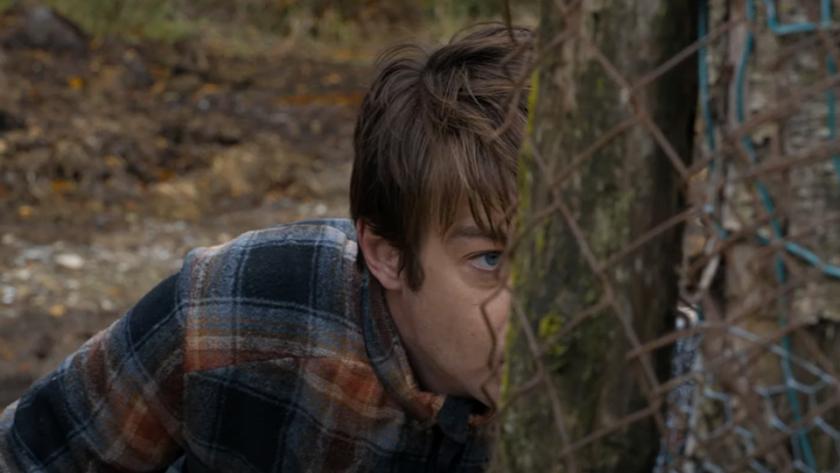“Be careful what you wish for, you might get it.” The Aesop-ian maxim roughly applies to Jérémie Pastor (Félix Kysyl) in Alain Guiraudie's Misericordia. Though unemployed Toulouse baker Jérémie doesn’t acquire the business that was run by his deceased mentor Jean-Pierre, the film’s ambiguous ending suggests he might still share it with the widow, Martine (Catherine Frot). Unless or until the gendarmes come calling.
Jérémie is first seen driving to Martine and Jean-Pierre’s village in rural Occitania – where he was raised and trained – in a protracted scene rendered eerily oppressive by the silence, the winding roads, and the autumn foliage. Retrospectively, after Jérémie has contrived his emotional regression and entrapment in the village at the hands of dodgy surrogate parents, the opening suggests the start of an extra perverse fairy tale in which he is both Hansel and Gretel. The bakery, an ogre-like character, and mushrooms that grow in soil nourished by human flesh compound the Grimm aura.
Following Jean-Pierre’s funeral, Jérémie stays on with Martine, doing nothing much except riling her son Vincent (played by Junkyard Dog director Jean-Baptiste Durand), who suspects the interloper of wanting to sleep with his mother. And he hits on an acquaintance, affable, slobbish retired farmer Walter (David Ayala), who drives him off with a shotgun.
Jérémie’s former schoolmate, Vincent surely recalls with long-festering envy that Jérémie was once close to his father. The film tantalizingly hints that Jean-Pierre was his apprentice’s first lover. Eliciting a resigned “Still?” from Martine when he requests a copy of a photo of the burly master baker in his swimming shorts, Jérémie admits he carries a torch for him. (Pictured below: Félix Kysyl, Jacques Develay)
 When Vincent chances on Jérémie half-heartedly foraging for mushrooms in the woods early one morning, their superficially friendly impromptu wrestle is charged with homoerotic tension. They are interrupted by the watchful Father Philippe (Jacques Develay), himself a mushroomer with burning desires. After Jérémie strikes a deadly blow, it is left to the priest and Martine, rivals for Jérémie’s attention, to decide his fate. It won’t unfold beyond the village, in the short term at least.
When Vincent chances on Jérémie half-heartedly foraging for mushrooms in the woods early one morning, their superficially friendly impromptu wrestle is charged with homoerotic tension. They are interrupted by the watchful Father Philippe (Jacques Develay), himself a mushroomer with burning desires. After Jérémie strikes a deadly blow, it is left to the priest and Martine, rivals for Jérémie’s attention, to decide his fate. It won’t unfold beyond the village, in the short term at least.
Guiraudie is an Occitan whose masterful Stranger by the Lake announced him as a major director in 2013. Like that suspenseful arthouse shocker (but without similar images of explicit queer sex – one flagging erection aside – or any sex at all), Misericordia evolves into a low-key policier.
In essence, though, it is a sly deadpan social comedy that considers mercy (misericordia in Latin) as an alternative response to a crime like murder. A Georges Bataille-influenced skewer of conventional morality, Guiraudie is not in the business of absolutes. By no means does the figure of the lusty old priest condemn the Roman Catholic clergy.
Guiraudie's regular cinematographer, Clare Mathon, endowed Misericordia with a stifling Bergman-esque atmosphere, its murky secret places redolent of Jérémie's psyche. And the director was well served by his cast: Frot makes Martina a Sphinx; Develay’s priest emerges as the film’s wily puppeteer.
An actor who inspires viewers' empathy, Kysyl has the boyishness of English actor Thomas Brodie-Sangster, while his disarming mix of plausibility and deviousness recalls John Hurt. Whatever horrible things are done by Jérémie – a Tom Ripley of the French woods – we’re with him all the way.













Add comment